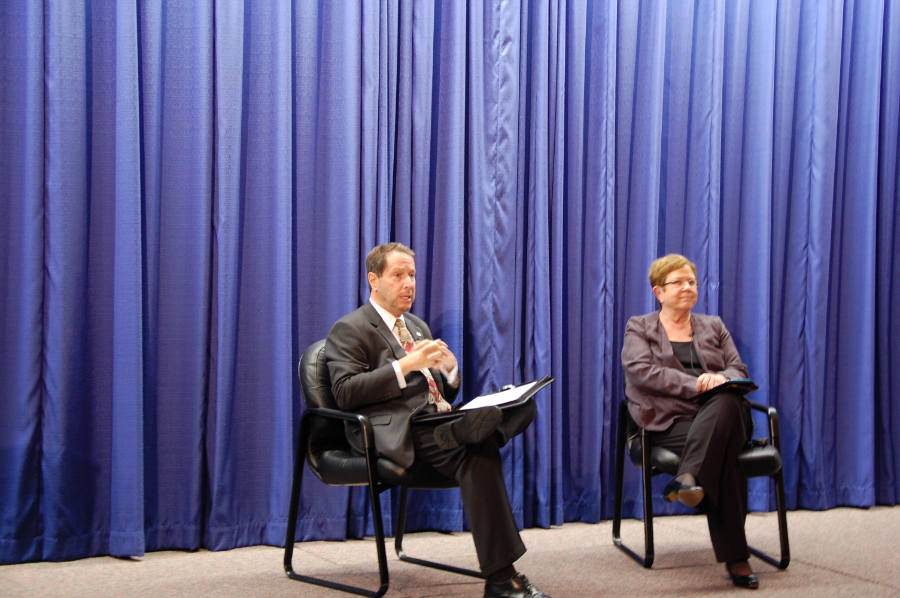Making the grade
Photo: Connor McCourtney
Professors organized book shelves, cleared desks and tidied up offices. Facility Services shined doorknobs and wiped down computer keyboards.
Silk ties and black suits replaced jeans and Drake apparel. Heels clicked down the halls.
The School of Journalism and Mass Communication was dressed to impress.
Six years have passed since the last accreditation renewal. The accreditation team arrived Sunday, Feb.13, to begin the intensive review process of the journalism program that continued through the morning of Wednesday, Feb. 16.
“In academic circles, accreditation is the ‘Good Housekeeping’ seal of approval,” said Kathleen Richardson, director of SJMC and associate professor of journalism. “It’s an outside, knowledgeable, neutral source to tell prospective students that this school is doing its job and fulfilling its promises.”
Drake has maintained its accreditation from the Accrediting Council on Education in Journalism and Mass Communications since 1972. The Council makes site visits every six years to renew a school’s accreditation status.
Preparation for the visit began during the 2009-10 school year. Richardson and other SJMC faculty gathered research, statistics and student work to assemble the self-study, the first step in the renewal process. The 300-plus page report holds every possible detail about the journalism program.
“Our students are getting jobs in a down economy. We have the highest internship rate on campus,” Richardson said. “Our conclusion is that we’re doing a hell of a job.”
Richardson mailed the completed self-study to the five members of the accreditation team in November. The team included professors from Penn State, the University of Kansas, the University of Nebraska and industry professionals who each specialize in a certain major.
“Even though the evaluators are coming in from bigger schools, they are not judging us from the standards of their universities,” Richardson said. “They’re making sure we’re being the best Drake School of Journalism and Mass Communication we can be.”
The Council developed a set of nine evaluation standards to foster and encourage excellence. The standards assess the curriculum, faculty, facilities and scholarship, among other aspects of the journalism program.
The two-day site visit provides the team time to gather evidence to determine if a school is in compliance with the standards. Team members joined classes, met with faculty members and engaged in small and large group discussions with students.
“It’s like being a great reporter,” Dean of SJMC Charlie Edwards said. “You have to do homework, prepare for the interviews, ask questions and then turn around and give a report, like a story, of what you learned.”
Edwards provided SJMC with an edge. He has been a member on four accreditation teams and has participated in Drake’s past accreditation renewals.
“The process is transferable. You always learn something that you can bring back to your school and practice,” Edwards said.
The Council outlines three options for accreditation status in its bylaws. A school can be accredited, denied or put on provisional accreditation, which requires a revisit in one year on those failed standards. Schools can fail one or two standards and still be awarded accreditation.
The SJMC has failed the diversity and faculty scholarship standards in past renewals. During the 2009-2010 academic year, a council of alumni, faculty, students and professionals met to improve these areas.
Senior public relations major Lawrence Crawford is a member of the Journalism Diversity Committee. Crawford works with a diversity consultant who recommends solutions Drake can implement. He brought these solutions to the council meetings last year.
“If you embrace the whole process with the right frame of mind, which I think we did, instead of being a burden, the process will be an opportunity for self-reflection,” Richardson said.
The price for the total accreditation experience is about $6,000, a sum Edwards argues is unbeatable.
“It’s an incredibly generous and valuable process,” Edwards said. “They devote their time here to make Drake better.”
Even after Meredith Hall emptied of students on Tuesday night, the accreditation team worked in Meredith 124C. The standards were split up among the team and then melded into one final evaluation.
The team had to hand in its written report to President David Maxwell before leaving Des Moines Wednesday morning.
The final word on the accreditation status will be revealed in March.
The Council accredits 111 programs in 40 states and D.C., and one program in Chile.
Only two other journalism schools are accredited in Iowa besides Drake, the University of Iowa and Iowa State University.
“Accreditation certifies that we’re receiving capable credentials to perform as a professional within our academia,” Crawford said. “It validates the diploma we get at graduation.”
The College of Business and Public Administration will also be undergoing review. An accreditation council is visiting today and will spend time talking with students and professors of the business school.

